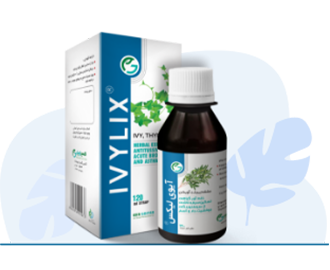

Relieve coughs caused by colds, acute bronchitis and pneumonia, relieve the symptoms of cough in asthma
120ml syrup
Ivylix Syrup contains thyme hydroalcoholic extract with the scientific name of Thymus vulgaris, and dried ivy extract with the scientific name of Hedera helix.
If the doctor does not have a prescription, use it as follows:
- Children 1 to 5 years old, 2.3 ml, 3 times a day
- Children 6 to 11 years old, 3.4 ml, 3 times a day
- People over 12 years old and adults, 4.5 ml, 3 times a day
It is safe to use this product in the recommended therapeutic doses. However, like any other medicinal product, if the consumer is allergic to any of the ingredients in Ivylix syrup, such as thymol and plants like thyme and ivy, there may be a rare allergic reaction and symptoms such as shortness of breath, skin rash, urticaria, swelling of the face, mouth, or throat will be seen. In this case, stop using the product and go to a medical center. Due to the presence of sorbitol, it will be possible to see the laxative effects of the product. Occasionally, gastrointestinal problems such as abdominal pain, nausea, and vomiting may occur. In this case, stop using the product and visit a doctor.
Relieve coughs caused by colds and acute bronchitis and pneumonia, relieve the symptoms of cough in asthma.
It is contraindicated in children under 1 year of age. People with a history of allergies to any of the ingredients, such as thymol and plants such as thyme and ivy, are prohibited from consuming the product.
It is forbidden to use this product during pregnancy and lactation
No specific drug interactions have been reported with this drug. However, it is recommended to avoid concomitant use with drugs that have the same or opposite effects.
Keep the medicine at a temperature below 30. C, away from moisture, light, and children.
The presence of thymol and carvacrol from the phenolic compounds of this plant has caused antispasmodic, antitussive, and thyme expectorant effects. These phenolic compounds cause antispasmodic effects in the airways by blocking calcium channels.
Also, rosmarinic acid in thyme, along with thymol and carvacrol, can help reduce the symptoms of inflammation in a variety of colds, bronchitis, and upper respiratory tract infections by inhibiting the synthesis of prostaglandins. The presence of saponins and flavonoid compounds in thyme indicates proven expectorant effects. The antimicrobial effects of this plant are also seen. Triterpene saponins present in the leaves of the Ivy plant exhibit expectorant, mucolytic, spasmolytic, bronchodilator, and antibacterial effects.
Among these saponins, in particular, the two compounds Hederacoside C and alpha Hydrin in the plant, with their indirect effects, inhibit intracellular harvesting of b2 receptors and cause the response of these receptors in the cell to be longer.
In this way, they increase the secretion of surfactants in the airways, which causes the mucolytic and expectorant effects of the Ivy plant. Besides, by applying this inhibition, the adenylate cyclase system remains continuously active, and this kind of relaxation of the smooth muscles of the bronchi becomes possible and continues.
In addition, the proven antimicrobial (antiviral, antifungal) effects of these saponins on certain microbial strains have been seen in various studies, which show that Ivy plant is also beneficial in the treatment of bronchitis And pneumonia. In this way, thyme and Ivy plants are used to relieve various types of coughs and prevent them from getting worse in acute bronchitis, colds, infections of the respiratory tract, sore throats and inflammation of the upper respiratory tract.